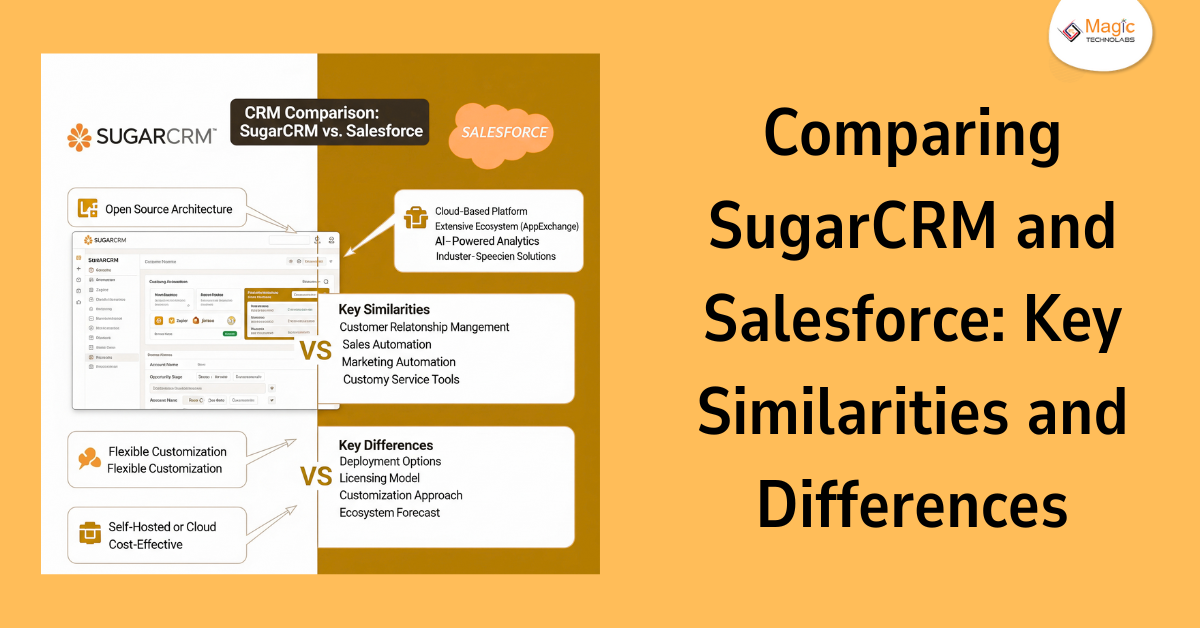Selecting the most appropriate CRM (Customer Relationship Management) platform in 2025 is no light-hearted choice. With customer experience at the center of all contemporary businesses, you require a platform that aids intelligent sales, robust services, and hassle-free automation. Two of the platforms that have sparked the most conversation are SugarCRM and Salesforce — both high-performance, but with significant variations that could make or destroy your strategy.
So, how do they compare? In this blog, we're going to cover the main similarities and differences between SugarCRM vs. Salesforce so you can make a more informed decision.
Let's dive in.
A Quick Overview of SugarCRM and Salesforce
Prior to getting into the actual process of comparison, the following is what both platforms offer at its basic level:
SugarCRM: It is a renowned CRM tool that is extremely flexible with roots in open-source and it is customizable. Popular with organizations that want to have control over what their CRM can do, especially when on-premise or hosted in a private cloud.
Salesforce: A cloud market leader, much acclaimed for its huge feature set, third-party add-ons, and enormous ecosystem. It's usually the preferred choice for enterprises and rapidly growing businesses.
Similarities Between SugarCRM and Salesforce
Although they serve varying tastes, SugarCRM and Salesforce have a few fundamental abilities that make them competitive options:
1. Integrated CRM Functionality
Both offer key CRM requirements:
Contact and account management
Tracking opportunities and pipelines
Task and calendar synchronization
Forecasting and reporting sales
2. Automation Tools
There are robust automation capabilities in both:
Automated workflows
Lead scoring
Email campaigns
Follow-up reminders
These capabilities enable teams to save time and close more deals — quickly.
3. Mobile Access
In 2025, it is all about teams on the road and also CRMs on the road. Both types of products, SugarCRM and Salesforce, have mobile-friendly counterparts with offline support which is great to use in the field and by distributed teams.
4. Custom Dashboards & Reports
Both platforms support:
Role-based dashboards
Visual pipeline management
Call / Email for Sales Inquiry Today
Custom reports with export capability
Key Differences Between SugarCRM and Salesforce
Now let's explore what differentiates them — because this is where your choice really begins to form.
1. Customization & Flexibility
SugarCRM: Incredibly customisable - ideal should you require customisations of workflows, data models and UI setups that are not locked in to a vendor. Best for businesses with complicated or specialized processes.
Salesforce: Provides customization as well, but much of it is done through its Lightning App Builder and vast AppExchange marketplace — which might take more developer resources or extra licensing.
Verdict:
If you require complete control and want to self-host, SugarCRM is the victor. With regards to plug and play additions and integrations Salesforce takes the day.
2. Pricing Model
SugarCRM: Provides more transparent and frequently reduced prices for SMBs. Private cloud and on-premise solutions lower the cost of recurring expenses in the long run.
Salesforce: Reputed for having a more convoluted pricing model, paying extra for additional features, integrations, and storage.
Verdict:
SugarCRM is more cost-effective, particularly for businesses looking to scale without getting nickel-and-dimed.
3. Cloud Deployment Options
SugarCRM: Provides on-premise, private cloud, and public cloud deployment. This would attract firms that have specific data residency or security requirements.
Salesforce: airborne (SaaS) 100 percent. Appropriate data put in position of companies that seek easiness and also quickness of set up, though not suitable to hosting data.
Verdict:
Want to control your data? Use SugarCRM. Desire all to be cloud-managed? Use Salesforce.
4. Third-Party Integrations
Salesforce: Has one of the largest marketplaces, the AppExchange, to which there are already thousands of connections to such popular applications as Slack, Zoom, or Mailchimp.
SugarCRM: Integrates with important tools as well, but perhaps with more manual configuration or API effort for less popular platforms.
Verdict:
Salesforce is the winner in terms of ecosystem depth. SugarCRM is a better choice if you're using fewer tools or need heavy, bespoke integrations.
What is the best CRM to use in 2025?
And here is a brief summary to assist you to decide:
Feature SugarCRM Salesforce
Customization Extremely flexible (even open source) Robust but organized
Cloud Options On-premise, private & public cloud Totally cloud-based
Pricing Transparent, SMB-friendly Feature-packed but can be expensive
Ecosystem & Integration Strong API support Huge App Exchange marketplace
Ideal Use Case Custom workflows, data control Scaleable cloud CRM with rapid setup
Revisiting: SugarCRM Vs Salesforce Vs What Is Best For You?
By 2025, both Salesforce and SugarCRM have evolved a lot. In case scalability, advanced automation, and strong app ecosystem is a priority, then you might find Salesforce as your choice. However, in case customization, flexibility on the prices, and control over your information is much more important to your company, SugarCRM is worth attention.
















